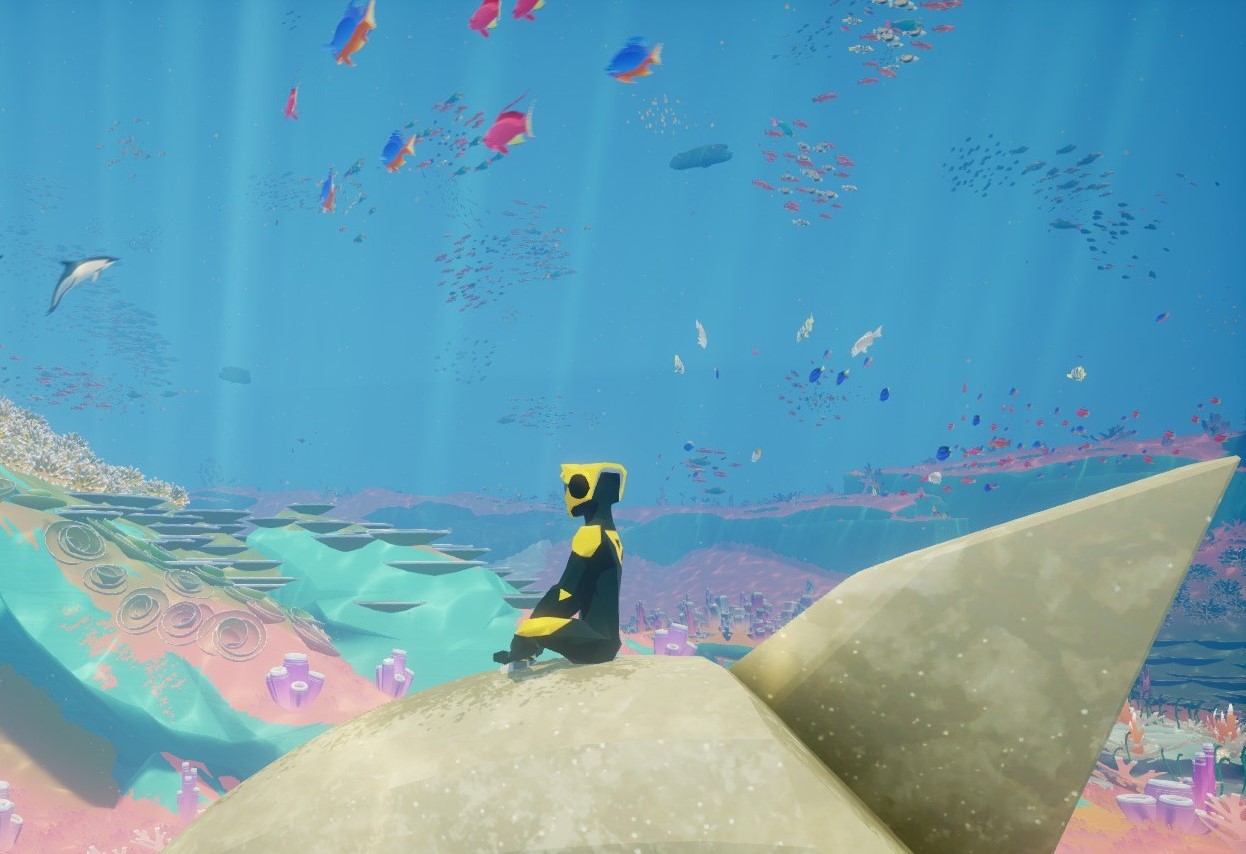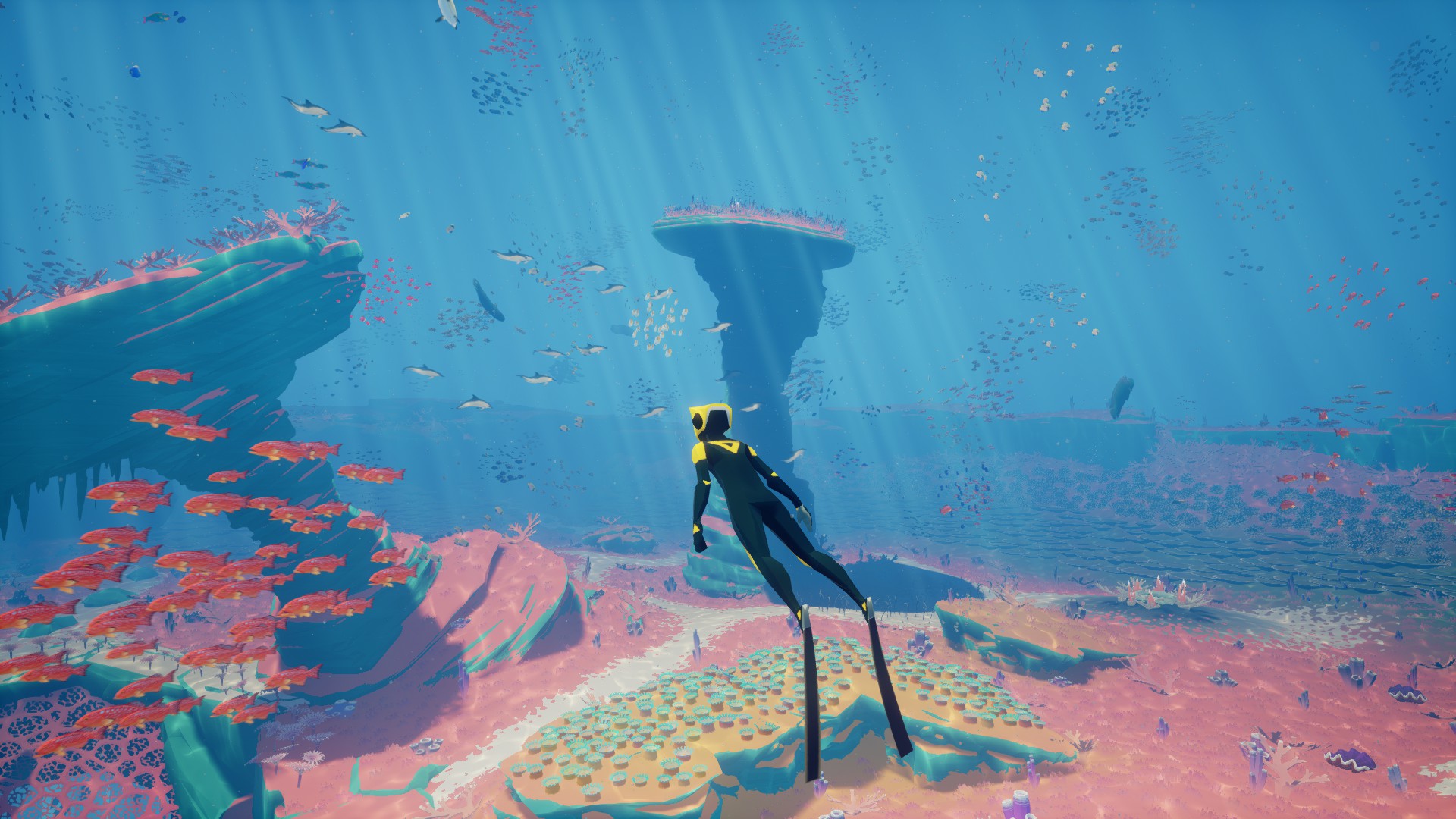Platforms:
PS4, PC
Released:
August 3, 2016
Publisher:
505 Games
Developer:
Giant Squid
In a sentence, ABZÛ is this calming, tranquil, explorative experience that sees the player character submerged into this gorgeous, painterly world of infinite breath meters and fish density cranked up to ultra.
Created by Giant Squid, the game is beautiful in both sound and visual design and it is a real testament to how games don’t need to adhere to standard formats to elicit joy. It does however suffer from a less than perfect control scheme and from an unfortunate, inescapable comparison to a similar game that managed to do things… better.

An Underwater Journey
Even well before its release I had heard ABZÛ described as an “underwater Journey”. For those not in the know, that description actually contains a double meaning because the game is easily comparable to a previous, massively acclaimed title by the name of ‘Journey’. Now I realise how hugely unfair it is to compare a game to one of the best titles of its niche but this comparison is basically unavoidable. Despite the drastic setting difference the two games are both 3D, minimalist, exploration games that feature a humanoid playable character who interacts with the world around them through auditory waves. Both games are praised for their sound design, feature no dialogue or UI and even share the same art director who brings his own unique beauty to the titles.
The problem is that Journey manages to succeed in ways that ABZÛ doesn’t. Both games have this elegance and flow to the world around them, except Journey was able to match that flow in the way the player character controls. ABZÛ sadly does not. It’s super unfortunate too because ABZÛ has these grand moments of awe that make you feel lost within the world but your immediately taken out of it when you flail around, trying to steer your character in the direction you want them to go. I should point out that the game strongly recommends playing with a controller and despite the fact that I played on a PC, I did in fact use an Xbox 360 controller during the game. The left stick controls movement and the right stick controls the camera but the two act totally independent of each other. That means that you can change the direction of the camera without changing the direction of your movement. Now I can see why this was done because it allows you to look around and take in the views without having to adjust your trajectory – but the fact is that it’s such an unfamiliar control scheme that muscle memory ended up becoming my foe. It also meant that when the camera was at an odd angle, the movements of the left stick didn’t translate comfortably to the movements of the character.
The other way that ABZÛ unfortunately falls short in the comparative department is that Journey was able to create this emotional attachment that ABZÛ couldn’t reach. By the end of Journey there was this investment in the character and in the world around you. You cared about what was happening and what may happen because the game built up to it with full force. Journey reached these higher highs, surprised and engaged players with changes of pace and really it just felt (for lack of a better word) like more of a… journey.
Art vs Game
I am absolutely not going to have the debate about whether games can be classified as art right now, but if I was to engage with a non believer, then ABZÛ would be one of the first examples I would show them. It is beautiful, immersive, awe-inspiring and is able to tell a narrative through visual interpretation alone. For people who are looking for a ‘game’ though, this may not be an experience tailored to you.
ABZÛ has a different philosophy when it comes to the fundamentals of ‘game’. It doesn’t prioritise gameplay, challenge, failure or success states or many other aspects your traditional title may bring. It is instead more interested in making an impression, creating something to talk about or designing a world to get lost within. These design philosophies work in its favour because this specific reshuffling of priorities creates a novel and interesting experience that, for the most part, feels unique.

ABZÛ also features these great moments within the game where things just open up and you’re presented with an ecosystem that becomes your own personal playground. Swimming alongside the fish, breaching the water with your newly acquainted fishy pals and then latching on to a friendly dolphin who wants to join in on the fun. There are also statues that you can meditate on that allow you to focus specifically on the different sea-life around you and watch them as they go about their general routines. These interactions really do manage to create tranquil, almost meditative qualities that are just such impressive achievements.
The game also manages to tell this story or make a statement based entirely from visual experiences within the game. Whilst everything is potentially up to interpretation, ABZÛ wasn’t particularly subtle in the way it presented its theme of technology taking over or destroying nature. Without spoiling too much, you work to reclaim that balance, releasing sea creatures, deepening water and growing new flora for the environments that surround you. Your playable character creates a bond with the ecosystem which helps to highlight the beauty that is lying underneath the surface.
Positive:
- Beautiful sound and visuals
- Engrossing and immersive world
- Highest fish density in gaming
Negative:
- Less than optimal control scheme
- Couldn't quite hit emotional heights
I really appreciated a lot of what ABZÛ had to offer despite any flaws that came along with it. If you’re thinking about picking this one up, then play through the game at your own pace, take in the sights and appreciate the little details around you. The game is completely capable of engrossing you within its world and submerging you from head to toe in its tranquility.












